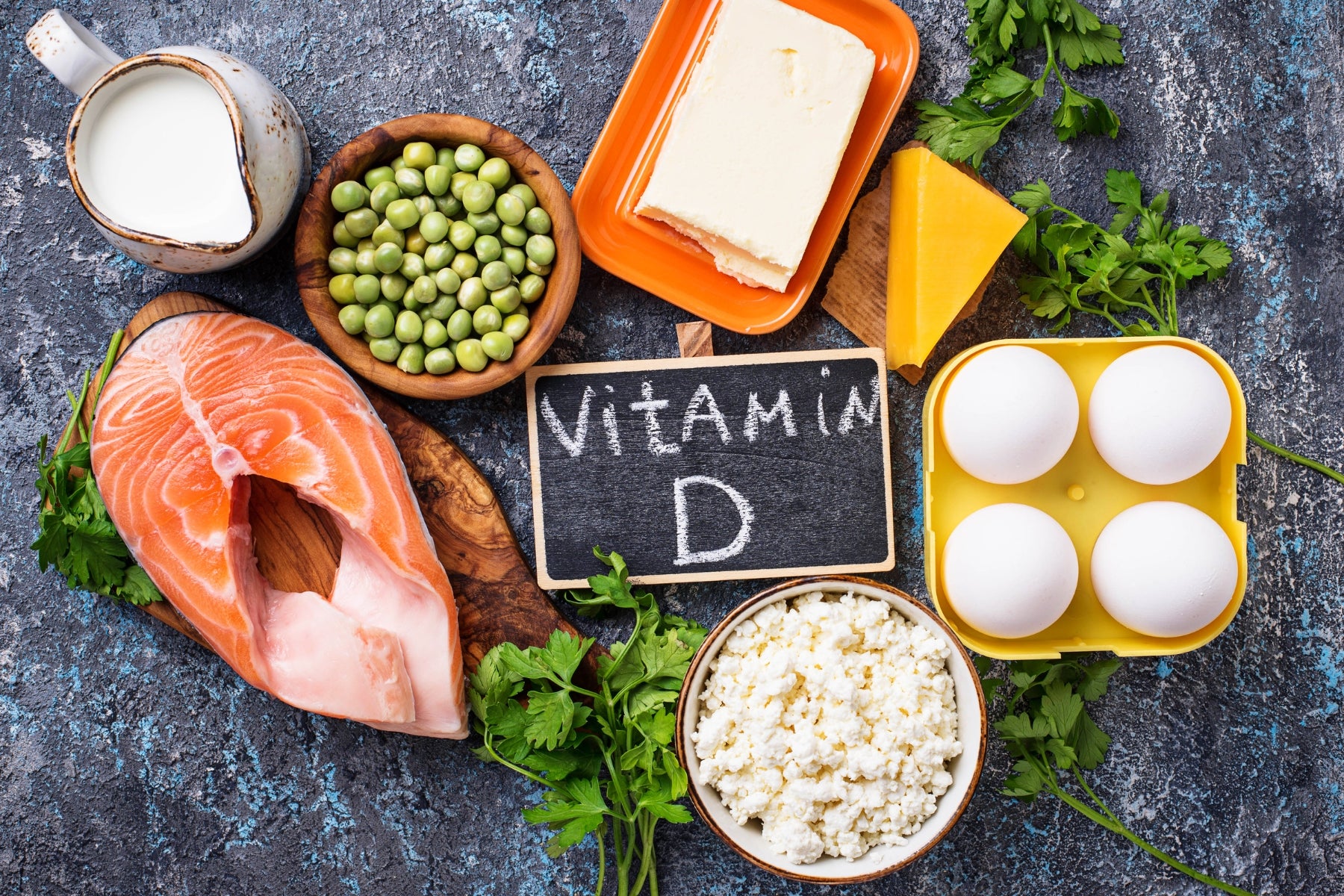
Nedostatek vitamínu rozpoznává a předcházení příznakům
Pokud hledáte způsoby, jak zvýšit kvalitu života, přistáli jste zde správně! Vitamíny jsou mikronutrienty, které jsou nezbytné pro vaši studnu. Vysvětlíme vám, které vitamíny jsou a kde je spolehlivě získáte.
Vitamíny jsou ze své podstaty potraviny, které vaše tělo musí být schopno vykonávat různé životně důležité funkce. Všechny vitamíny jsou nezbytné pro vaše tělo a, jak název napovídá, nezbytné pro vaši vitalitu v každodenním životě. Pouze vitamin D a vitamin B3 mohou vaše tělo samotné. Musíte vzít většinu vitamínů skrz jídlo. V tomto článku vám vysvětlíme, jakou roli plní vitamíny ve vašem těle, kolik byste měli vzít a jak mohou potenciální příznaky nedostatku komentovat.
Časté nedostatky vitamínů a jejich potenciální příčiny
| příznak | Nedostatek |
|---|---|
| Slabost koncentrace | Vitamin d |
| únava | Vitamin d, Vitamin B12 |
| Vyrážka v oblastech, které jsou často vystaveny slunci | Vitamin B3 |
| Lehké modřiny/ modřiny | Vitamin K., Vitamin c |
| demence | Vitamin B1, Vitamin B3, Vitamin B12 |
| Citlivé kosti | Vitamin d |
| Bolestivé silné červené nebo oteklé rty | Vitamin B2, Vitamin B3, Vitamin B6 |
| Zánět jazyka | Vitamin B2, Vitamin c |
| Abnormální pocity brnění nebo neslyšících | Vitamin B1 |
| Otoky proudění nebo bolest | Vitamin c |
| Kognitivní deficity | Vitamin B1, Vitamin B3, Vitamin B6, Vitamin B12 |
| Zhoršené noční vidění | Vitamin a |
| Zataženo rohovky/rozmazaného pohledu | Vitamin a |
| Neslyšící pocit | Vitamin B1, Vitamin B12 |
| Časté krvácení dásně nebo ztráta zubů | Vitamin c |
Vitamin A: Pro oči a pokožku
Vitamin A produkuje pigmenty naší kůže oční sítě. Kromě očí je vitamin A nezbytný pro zdraví kůže. Doporučený den pro dospělé je cca.1
Které příznaky nedostatku vitaminu mohou nastat u vitamínu A?
Nedostatek vitaminu A. je hlavní příčinou slepoty u dětí. Nedostatek vitamínu A může způsobit následující příznaky:
- Xerofthalmie: suchá, zahuštěná konjunktiva a rohovka
- Noc -blindness
- Nadržené nádory (metaplasie) na konjunktivě, které vedou k rozmazanému vidění 2
Přírodní zdroje vitamínu A
- Sladké brambory (961 μg/ 100 g)
- Mrkev (852 μg/ 100 g)
- Tuňák (757 μg/ 100 g)
- Dýně (558 μg/ 100 g)
- Spinat (524 μg/ 100 g)
- Med Melon (169 μg/ 100 g)
Vitamin B1: Je nezbytný pro metabolismus uhlohydrátů
Vitamin B1 je nesmírně důležitý, zejména pro metabolismus uhlohydrátů.3 Pomáhá snižovat a uvolňovat energii z potravy. Je proto nepřímo důležité pro obecné zdraví kůže, vlasů, svalu, mozku a nervů.4 Potřeba vitamínu B1 se s věkem snadno snižuje. Doporučená denní dávka vitamínu B1 je u dospělých mezi 1,1 a 1,3 mg/den 5
Které příznaky nedostatku vitamínu B1 mohou nastat?
V důsledku jednoho Vitamin B1 kvůli nedostatku Onemocnění beriberi vzniká, kde alkoholici trpí obzvláště často. Vede k periferní neuropatii. Lidé s touto chorobou mají snížení smyslových, motorických a reflexních funkcí.6
Přírodní zdroje vitamínu B1
- Čerstvé i sušené ovoce
- Lněné (1,6 mg/100g)
- Losos (0,3 mg/100 g)
- Hrášek (0,3 mg/100 g)
- Tofu (0,2 mg/100 g)
- Hnědá rýže (0,2 mg/100g) 7
Vitamin B2: Pro kůži, mozek, vlasy, krev a nervy
Podobně jako B1 je B2 nesmírně důležitý pro zdraví kůže, mozku, vlasů, krve a nervů, protože také hraje důležitou roli v metabolismu energie našeho těla. Muži potřebují.8
Které příznaky nedostatku vitamínu B2 mohou nastat?
Nedostatek vitaminu B2 Stává se to jen velmi zřídka, ale důsledky mohou být rozmanité a vážné. Kromě nedostatečného příjmu jsou způsobeny endokrinní anomálie (jako je nedostatek hormonu štítné žlázy) a různá nemoci vitamínu B2.9 Příznaky a příznaky vitamínu B2 v nedostatku nedostatku kožních onemocnění, hyperémie a otoku v ústech a krku, roztrhané rohy úst, cheilóza (oteklé, prasklé rty), vypadávání vlasů, sexuální problémy, bolest v krku, bolesti, bolest v krku, bolesti, bolest v krku, bolesti, bolesti, bolesti, bolest v krku svědění a červené oči, stejně jako poškození jater a nervů.
Přírodní zdroje vitamínu B2
- Mandle (1,1 mg/100 g)
- Losos (0,5 mg/100 g)
- Houby (0,5 mg/100 g)
- Spinat (0,5 mg/100 g)
- Vejce (0,5 mg/100 g)
Vitamin B3: Pro váš imunitní systém
Vitamin B3 je velmi důležitý pro využití energie našeho jídla a zdraví kůže, krvinek a mozku. Hraje ústřední roli ve funkci nervů a játra.12 U dospělých se denní požadavek vitamínu B3 s věkem mírně snižuje. Muži potřebují cca.13
Které příznaky nedostatku vitamínu mohou nastat?
Obtížnější Nedostatek vitaminu B3 vede k nemoci zvané Pellagra. Pellagra způsobuje vyrážku nebo hnědé zabarvení, když je kůže vystavena slunečnímu světlu. Kůže se také vyvíjí drsný vzhled podobný spánku.14 Kromě toho může Pellagra způsobit nápadně červený jazyk a změny v trávicím traktu, které vedou k zvracení, zácpě nebo průjmu. Mezi neurologické stížnosti Pellagra patří deprese, apatie, bolest hlavy, únava, ztrátu paměti, což může vést k agresivnímu chování a vizuální halucinace.15
Přírodní zdroje vitamínu B3
- Tuňák (22,1 mg/100g)
- Arašídy (14,4 mg/100g)
- Kuřecí prsa (9,5 mg/100g)
- Houby Portobello (6,3 mg/100g)
- Hnědá rýže (2,6 mg/100 g)
Vitamin B5: Pro stabilní rovnováhu hormonů
Vitamin B5 není jen, stejně jako jiné vitamíny B pro metabolismus energie, ale také pomáhá produkci neurotransmiterů, steroidních hormonů, mastných kyselin a hemoglobinu. Mladí lidé a dospělí muži a ženy potřebují 6 mg vitamínu B5 denně od 14 let. 16
Které příznaky nedostatku vitamínu B5 mohou nastat?
Protože je vitamin B5 obsažen téměř ve všech potravinách, dochází k vadám zřídka, s výjimkou lidí s těžkou podvýživou.17 Pokud někdo u jednoho Nedostatek vitaminu B5 Trpí, obvykle jde ruku v ruce s nedostatkem jiných živin, takže je obtížné identifikovat specifické účinky pro nedostatek vitamínu B5. Nedostatek vitaminu B5 se vyskytuje téměř výhradně u lidí, kteří spotřebovali metabolické antagonisty vitamínu B5.18
Přírodní bobtnání vitamínu B5
- Slunečnicová semena (7 mg/ 100 g)
- Shiitake houby (3,6 mg/ 100g)
- Losos (1,9 mg/ 100g)
- Avocados (1,4 mg/ 100g)
- Sladké brambory (0,5 mg/ 100 g)
Vitamin B6: Pro produkci červených krvinek
Vitamin B6 pomáhá s regulací homocysteinových zrcadel (hladiny aminokyseliny homocysteinu v krvi) a může snížit riziko srdečních chorob. Podporuje přeměnu tryptofanu na niacin a serotonin, neurotransmiter, který hraje ústřední roli pro spánek, chuť k jídlu a náladě. Vitamin B6 pomáhá s červeným krvištěm a ovlivňuje kognitivní dovednosti a imunitní funkci.19 Dospělí muži mají denní požadavek 1,6 mg vitamínu B6 za den. Ženy 1,4 mg za den nebo 1,5-1,8 mg za den, pokud jsou těhotná nebo kojena.20
Které příznaky nedostatku vitamínu B6 mohou nastat?
Izolovaný nedostatek vitamínu B6 je extrémně vzácný a obvykle je spojen s nízkými koncentracemi jiných vitamínů komplexu B, jako je vitamin B12. A Nedostatek vitamínu B6 způsobuje biochemické změnykteří se stále více zřejmé s progresivním nedostatkem.
Nedostatek vitaminu B6 je spojen s anémií, dermatitidou s cheilózou (lupiny na rtech a praskliny na rohy úst) a glossitidou (oteklý jazyk), deprese a zmatek a oslabeným imunitním systémem. Lidé s mírným nedostatkem nemohou mít příznaky nebo příznaky nedostatku měsíce nebo dokonce roky. U kojenců vede nedostatek vitaminu B6 k podrážděnosti, abnormální ztrátě sluchu a záchvaty jako křeče.21 Nemoci ledvin V posledním stádiu mohou chronická renální nedostatečnost a další onemocnění ledvin také způsobit nedostatek vitamínu B6.22
Přírodní zdroje vitamínu B6
- Losos (0,9 mg/ 100g)
- Tofu (0,5 mg/ 100g)
- Banány (0,4 mg/ 100 g)
- Brambory (0,3 mg/ 100g)
- Sladké brambory (0,2 mg/ 100g)
Vitamin B9: Zabraňuje srdečním onemocněním
Vitamin B9, známý také jako kyselina listová, je nezbytný pro produkci červených krvinek, může snížit hladiny homocysteinu (hladiny aminokyseliny homocysteinu v krvi) a tím snížit riziko srdečních chorob. Pomáhá zabránit vrozeným vadám mozku a páteře, pokud se vezme na začátku těhotenství. Dospělí muži a ženy potřebují cca. Stále končí cca.23
Které příznaky nedostatku vitamínu B9 mohou nastat?
Izolovaný nedostatek vitamínu B9 je neobvyklý a obvykle existuje souběžně s jinými deficity živin, protože úzce souvisí se špatnou výživou, alkoholismem a malabsorpčními poruchami. Megaloblastická anémie, která je charakterizována velkými, abnormálními krevními buňkami, je primárním klinickým znakem nedostatku vitamínu B9.25 Příznaky nedostatku kyseliny listové Hrabě únava, pocity slabosti, obtíže koncentrace, podrážděnost, bolesti hlavy, palpitace a dušnost.26 Nedostatek vitaminu B9 může způsobit bolest na jazyku a ústní sliznici, změny v kůži, vlasů nebo pigmentaci nehtů a zvýšené koncentrace homosexuálů v krvi.27
Přírodní bobtnání vitamínu B9
- Sójové boby (311 μg/ 100 g)
- Čočky (181 μg/ 100 g)
- Chřest (149 μg/ 100 g)
- Špenát (146 μg/ 100 g)
- Brokolice (108 μg/ 100 g)
Vitamin B12: Pro syntézu DNA
Vitamin B12 podporuje snížení homocysteinového zrcadla (hladiny aminokyseliny homocysteinu v krvi), a proto může snížit riziko srdečních chorob, jakož i vitamínu B9. Přispívá k tvorbě červených krvinek a DNA. Vitamin B12 pomáhá s tvorbou nových buněk s rozpadem některých mastných kyselin a podporuje růst nervových buněk.28 Denní požadavek na vitamin B12 pro dospělé muže a ženy je kolem 4,0 µg denně. Těhotné ženy potřebují cca.29
To se děje s nedostatkem vitamínu B12
Nedostatek vitaminu B12 Je charakterizován únavou, obecnou slabostí, anémií, ztrátou chuti k jídlu a hubnutím.30 Neurologické problémy, jako je otupělost a brnění v rukou a nohou, mohou nastat.31 Dalšími příznaky nedostatku vitamínu B12 jsou deprese, zmatek, rovnováha, demence, špatná paměť a bolest v ústech nebo na jazyku. Neurologické příznaky nedostatku vitamínu B12 se mohou vyskytnout také bez anémie, a proto je včasná diagnóza a intervence důležitá, aby se zabránilo nevyléčitelnému poškození.32
Přírodní zdroje vitamínu B12
- Mušle (98,9 μg/ 100 g)
- Tuňák (10,9 μg/ 100 g)
- Hovězí maso (7,5 μg/ 100 g)
- Vejce (1,1 μg/ 100 g)
- Mléko (0,5 μg/ 100 g)
Vitamin C: je nutný k výrobě kolagenu
Naše tělo potřebuje vitamín C k vytvoření kolagenu 33, pojivová tkáň, která je nutná k léčení ran a podporuje stěny krevních cév. Vitamin C pomáhá vytvářet neurotransmitery (noradrenalin a serotonin). Je to také antioxidační a neutralizované nestabilní molekuly, které mohou poškodit buňky, a proto způsobují rakovinu.34 Dospělé muži potřebují cca.35
Které příznaky nedostatku vitamínu C mohou nastat?
Akutní Nedostatek vitamínu C. je relativně rychlý ve srovnání s jinými nedostatky živin. Nedostatek vitamínu C vede k kurdě.36 Průběh fázové formace se velmi liší, ale první známky mohou nastat do jednoho měsíce.37
Počáteční příznaky mohou být únava, malátnost a gingivitida.38 Jak nedostatkem vitamínu C postupuje, syntéza kolagenu je narušena a pojivová tkáň je oslabena, což vede k Petechii, bolesti kloubů, špatnému hojení ran nebo hyperkeratózou.39 Dalšími známkami šourku jsou deprese a oteklé, krvácení dásní a uvolnění nebo ztráty zubů v důsledku tkáňových ořízků a kapilární slabosti (kvůli nedostatku kolagenu).40
Přirozené zdroje vitamínu C
- Guava (228 mg/ 100 g)
- Paprika (128 mg/ 100 g)
- Kiwi (93 mg/ 100 g)
- Jahody (59 mg/ 100 g)
- Pomeranče (53 mg/ 100 g)
Vitamin D: Posiluje kosti
Vitamin D pomáhá stabilizovat normální hladinu vápníku a fosforu v krvi, což posiluje kosti. Podporuje také tvorbu zubů a kostí. Vitamin D může být tělem syntetizován, pokud jste pravidelně ozářeni sluncem. Pokud dospělý sotva dostane sluneční světlo v každodenním životě, měl by konzumovat asi 20 µg denně ve formě dietního doplňku.41
Toto jsou typické příznaky nedostatku vitamínu D
Rachitida a osteomalacie jsou klasická onemocnění nedostatku vitamínu D. U dětí způsobuje nedostatek vitamínu D Rachitis, což je charakterizována nedostatkem mineralizace kostní tkáně, což vede k měkkým kostem a kosterním deformacím.42
U dospělých a Nedostatek vitamínu D. vést k osteomalacii, což má za následek slabost kosti. Příznaky bolesti kostí a slabosti svalů mohou naznačovat nedostatečnou hladinu vitamínu D, ale takové příznaky mohou být jemné a v počátečním stádiu zůstávají nezjištěny.43
Přirozené zdroje vitamínu D
- Losos (16,7 μg/ 100 g)
- Houby (které leží na slunci) (31,9 μg/ 100 g)
Vitamin E: Neutralizované nestabilní molekuly
Vitamin E je antioxidant, který neutralizuje nestabilní molekuly, které mohou poškodit buňky. Chrání také vitamin A a mastné kyseliny před poškozením. Potřeba vitamínu E se s věkem snižuje. Dospělé muži potřebují 12-15 mg za den a ženy.44
Které příznaky nedostatku vitamínu E se mohou objevit?
Protože trávicí trakt vyžaduje, aby tuk absorboval vitamín E, existuje vyšší pravděpodobnost vady u lidí s poruchami absorpce tuků než u lidí bez takových poruch.45 Masnální příznaky vitamínu E Zahrnujte retinopatii, periferní neuropatii, myopatii kosterního svalu, ataxii a poškození imunitního systému.46
Přirozené zdroje vitamínu E
- Slunečnicová semena (26,1 mg/ 100 g)
- Mandle (25,6 mg/ 100 g)
- Avocados (2,1 mg/ 100 g)
- Špenát (2,1 mg/ 100 g)
- Butternut-Kürbis (1,3 mg/ 100 g)
Vitamin K: nezbytné pro srážení krve
Vitamin K aktivuje různé proteiny a vápník, a je proto zvláště nezbytný pro srážení krve. Doporučená denní dávka vitamínu K pro dospělé muže je kolem 70–80 µg denně. Dospělá žena potřebuje cca.47
Které příznaky nedostatku vitamínu mohou nastat?
Krvácení jsou klasickými známkami jednoho Nedostatek vitamínu K., ačkoli k těmto účinkům dochází pouze ve závažných případech. Protože vitamin K je vyžadován pro karboxylace osteokalcinu v kosti, může nedostatek vitamínu K snížit mineralizaci kostí, a proto přispívat k osteoporóze nebo obecnému snížení hustoty kostí.48
Přírodní vitamín k prameny
- Kohl (419 μg/ 100 g)
- Brokolice (141 μg/ 100 g)
- Klíčky zelí (140 μg/ 100 g)
- Chřest (51 μg/ 100 g)
- Kiwi (40 μg/ 100 g)
Často kladené otázky o vitamínech
Které vitamíny chybí v případě únavy?
Defekty vitamínu B12, C a D mohou způsobit únavu. Vzhledem k tomu, že nedostatek vitamínu C je ve rozvinutých zemích velmi vzácný, měli byste především na své zrcadlo vitamínu B12 a vitamínu D. Nedostatek vitaminu B12 inhibuje produkci červených krvinek, které ovlivňují transport kyslíku v těle.49 To znamená, že se cítíte unavení nebo pomalu. Dokonce i nízký nedostatek vitamínu D může vést k únavě a obecně špatnému dobře.50
Které vitamíny mi chybí?
Možná naše bude Stůl symptomů Pomozte zjistit, který nedostatek vitamínů byste mohli trpět. Přesto byste měli s lékařem vždy diskutovat o podezřelých příznacích nebo příznacích. To může zkontrolovat podezření na určitý nedostatek pomocí krevního testu.
Jaký nedostatek vitaminu v suché pokožce?
Jedním z nejznámějších příznaků vitamínu D je suchá kůže. Vitamin D je zvláště důležitý pro zdraví vaší pokožky, protože stimuluje receptory, které jsou zodpovědné za tvorbu kožní bariéry, která je nezbytná pro ochranu kůže.51
Jaké příznaky máte s nedostatkem vitamínu B?
Existuje mnoho různých vitamínů B, které splňují širokou škálu funkcí v těle. Je důležité je neumisťovat do zásuvky, protože defekty těchto různých variací vitamínu B mohou vést k různým příznakům. Náš Stůl symptomů By vám měl poskytnout dobrý přehled.
Co dělají vitamíny v těle?
Vitamíny umožňují v našem těle širokou škálu funkcí. Naše tělo by nebylo schopno bez vitamínů, vitálních úkolů, jako je přeměna potravy na energii, struktura a udržování kostí, zubů, svalů, kůže, krve a vlasů a udržování funkčnosti našeho mozku, našich očí, našich Nervy - a setkat se s imunitním systémem.
Jaké vitamíny v případě bezlibosti?
Nedostatek mnoha různých vitamínů a minerálů může vést k bezplatnosti přímo i nepřímo. Často je doprovázen nedostatek motivace problémů s únavou a koncentrací. Nedostatek vitamínů B, vitamínu D nebo minerály železa a hořčík mohou zvláště rychle způsobit bezhodnosti.52
Které vitamíny berou stůl dohromady?
Chcete -li nabídnout vašemu tělu nejlepší stav pro účinnou absorpci živin v krvi, měli byste zvážit dohromady následující živiny. Některé živiny se doplňují nebo se navzájem narušují ve své funkci ve vašem těle - v závislosti na tom, co a kdy jíte, můžete posílit nebo chybět výhody těchto zdravých potravin (a doplňků výživy).
Vápník a vitamín D
Většina vápníku zaznamenaného v našem těle je uložena v našich kostech a vitamín D pomáhá s absorpcí, transportem a skladováním tohoto vápníku v našich kostech.53
Vitamin D a zdravé mastné kyseliny
Vitamin D je jeden z tuků -rozpustných vitamínů. To znamená, že musí být smíchán s tukem, aby byl absorbován tělem. Je proto vhodné kombinovat potraviny bohaté na vitamín D s vysoce kvalitním tukem, jako je olivový olej, lněný, avokádo, ryby, semena chia nebo ořechy.54
Železo a vitamín C (zejména pro vegetariány)
Železo může být použity zeleninovými a živočišnými potravinami. Zeleninové potraviny mají hodně železa, ale díky jiným látkám - jako je kyselina špenátová - může být často absorbována pouze do omezeného rozsahu. Vitamin C kompenzuje tento absorpční účinek, protože podporuje absorpci železa.55
Jak si všimnete, že máte nedostatek vitamínů?
Příznaky nedostatku vitamínu mohou být velmi rozmanité a závisí na příslušném vitaminu. Časté příznaky jsou únava, slabost v koncentraci, náchylnost k infikování, suchou pokožku, křehké nehty a vlasy, svalové slabosti nebo výkyvy nálad. Protože k těmto příznakům se mohou vyskytnout také u jiných onemocnění, je vhodné lékařské vysvětlení s krevním testem, pokud je podezření na nedostatek vitamínu.
Jaký je nejběžnější nedostatek vitamínů?
Podle studie Národní spotřeby je v Německu nedostatečná nabídka vitamínu D rozšířená, zejména v zimních měsících. Protože vitamin D je tvořen hlavně kůží kůže, mnoho lidí má nedostatek, pokud jsou příliš málo venku. Kyselina listová, jód a železo patří také mezi kritické živiny, ve kterých je často podhodnocení.
Možná vás to také zajímá
Sbalitelný obsah
Zdroje
- D. (2020). Referenční hodnoty pro dodávku živin. Načteno 2. srpna 2020,
- Alfred Sommer, Nedostatečnost a klinické onemocnění vitamínu: V historickém přehledu, The Journal of Nutrition, Svazek 138, vydání 10, říjen 2008, strany 1835-1839,
- Manzetti S, et al. Thiaminová funkce, metabolismus, absorpce a transport. Biochemie. 2014; 53 (5): 821-35.
- Institut medicíny. Rada pro jídlo a výživu. Dietní referenční příjmy: Thiamin, riboflavin, niacin, vitamín B6, folát, vitamín B12, kyselina pantothenová, biotin a cholin. Washington, DC: National Academy Press; 1998.
- D. (2020). Referenční hodnoty pro dodávku živin. Načteno 2. srpna 2020,
- Betendorff L. Thiamin. In: Erdman JW, MacDonald IA, Zeisel SH, eds. Současné znalosti ve výživě. 10. ed. Washington, DC: Wiley-Blackwell; 2012: 261-79.
- Bemeur C, Butterworth RF. Thiamin. In: Ross AC, Caballero B, Cousins RJ, Tucker KL, Ziegler TR, eds. Moderní výživa ve zdraví a nemoci. 11. ed. 2014: 317-24.
- D. (2020). Referenční hodnoty pro dodávku živin. Načteno 2. srpna 2020,
- Rivlin Rs. Riboflavin. In: Coates PM, Betz JM, Blackman MR, et al., Eds. Encyklopedie doplňků stravy. 2. Ed. 2010: 691-9.
- Řekl HM, Ross AC. Riboflavin. In: Ross AC, Caballero B, Cousins RJ, Tucker KL, Ziegler TR, eds. Moderní výživa ve zdraví a nemoci. 11. ed. 2014: 325-30.
- Institut medicíny. Rada pro jídlo a výživu. Dietní referenční příjmy: Thiamin, riboflavin, niacin, vitamín B6, folát, vitamín B12, kyselina pantothenová, biotin a cholin. Washington, DC: National Academy Press; 1998.
- Kirkland JB. Niacin. In: Ross AC, Caballero B, Cousins RJ, Tucker KL, Ziegler TR, eds. Moderní výživa ve zdraví a nemoci, 11. ed. Baltimore, MD: Williams & Wilkins; 2014: 331-40.
- D. (2020). Referenční hodnoty pro dodávku živin. Načteno 2. srpna 2020,
- Institut medicíny. Rada pro jídlo a výživu. Dietní referenční příjmy: Thiamin, riboflavin, niacin, vitamín B6, folát, vitamín B12, kyselina pantothenová, biotin a cholin. Washington, DC: National Academy Press, 1998.
- Penberthy WT, Kirkland JB. Niacin. In: Erdman JW, MacDonald IA, Zeisel SH, eds. Současné znalosti ve výživě, 10. vydání. Washington, DC: Wiley-Blackwell; 2012: 293-306.
- D. (2020). Referenční hodnoty pro dodávku živin. Načteno 2. srpna 2020,
- Miller JW, Rucker RB. Kyselina pantothenová. In: Erdman JW, MacDonald IA, Zeisel SH, eds. Současné znalosti ve výživě. 10. ed. Washington, DC: Wiley-Blackwell; 2012: 375-90.
- Institut medicíny. Rada pro jídlo a výživu. Dietní referenční příjmy: Thiamin, riboflavin, niacin, vitamín B6, folát, vitamín B12, kyselina pantothenová, biotin a cholin. Washington, DC: National Academy Press; 1998.
- Institut medicíny. Rada pro jídlo a výživu. Dietní referenční příjmy: Thiamin, riboflavin, niacin, vitamín B6, folát, vitamín B12, kyselina pantothenová, biotin a cholin. Washington, DC: National Academy Press; 1998.
- D. (2020). Referenční hodnoty pro dodávku živin. Načteno 2. srpna 2020,
- McCormick D. Vitamin B6. In: Bowman B, Russell R, eds. Současné znalosti ve výživě. 9. Ed. Washington, DC: International Life Sciences Institute; 2006.
- Mackey A, Davis S, Gregory J. Vitamin B6. In: Shils M, Shike M, Ross A, Caballero B, Cousins R, Eds. Moderní výživa ve zdraví a nemoci. 10. ed. 2005.
- D. (2020). Referenční hodnoty pro dodávku živin. Načteno 2. srpna 2020,
- Kyselina Carmel R.. In: Shils M, Shike M, Ross A, Caballero B, Cousins RJ, eds. Moderní výživa ve zdraví a nemoci. 11. ed. 2005: 470-81.
- Stover PJ. Kyselina listová. In: Ross AC, Caballero B, Cousins RJ, Tucker KL, Ziegler TR, eds. Moderní výživa ve zdraví a nemoci. 11. ed. 2012: 358-68.
- Institut medicíny. Rada pro jídlo a výživu. Dietní referenční příjmy: Thiamin, riboflavin, niacin, vitamín B6, folát, vitamín B12, kyselina pantothenová, biotin a cholin. Washington, DC: National Academy Press; 1998.
- Ho RC, Cheung MW, Fu E, et al. Je vysoká úroveň homocystonů rizikovým faktorem kognitivního poklesu u starších osob? Systematický přehled, metaanalýza a meta regrese. Na J Geriatr Psychiatry 2011;
- Herbert V. Vitamin B12 v současných znalostech ve výživě. 17. ed.
- D. (2020). Referenční hodnoty pro dodávku živin. Načteno 2. srpna 2020,
- Bernard MA, Nakonzny PA, Kashner TM. Vliv nedostatku vitamínu B12 na starší veterány a její vztah ke zdraví. J Am Geriatr Soc 1998;
- Healton EB, Savage DG, Breast JC, Garrett TF, Lindenbaum J. Neurologické aspekty nedostatku kobalaminu. Medicine 1991;
- Bottiglieri T. Folát, vitamin B12 a neuropsychiatrické poruchy. Nutr Rev 1996;
- Cook GC. Scurvy v britském Mercantile Marine v 19. století a příspěvek nemocniční společnosti Seaetia's Hospital Society. Postgraduální lékařský časopis. 2004; 80 (942): 224-9.
- Jacob Ra, Sot G. Funkce a stav vitamínu C při chronickém onemocnění. Nutr Clin Care 2002;
- D. (2020). Referenční hodnoty pro dodávku živin. Načteno 2. srpna 2020,
- Wang Ah, stále C. Starý svět se setká s moderním: Případová zpráva o škurvu. Nutr Clin Practice 2007;
- Levine M, Conry-Cantilena C, Wang Y, které RW, Washko PW, Dhariwal KR, et al. Farmakokinetika vitamínu C u zdravých dobrovolníků: Důkazy o doporučeném dietním příspěvku. Proc Natl Acad Sci U S A 1996;
- Francescone MA, Levitt J. Scurvy maskovaná jako leukocytoklastická vaskulitida: kazuistika a přehled literatury. Cutis 2005;
- Carr AC, zdarma B. Směrem k novému doporučenému dietnímu příspěvku na vitamín C založené na antioxidačních a zdravotních účincích u lidí. Na J Clin Nutr 1999;
- Stephen R, Utecht T. Scurvy identifikovaný na pohotovostním oddělení: Případová zpráva. J Emererg Med 2001;
- D. (2020). Referenční hodnoty pro dodávku živin. Načteno 2. srpna 2020,
- Wharton B, Bishop N. Ricket. Lancet 2003;
- Cranney C, Horsely T, O'Donnell S, Weiler H, Ooi D, Atkinson S, et al. Účinnost a bezpečnost vitamínu D. Zpráva o důkazech/hodnocení technologie č. 158 PŘIPOMÍNKA PRACOVNÍHO PRACOVNÍHO PRAKTU ZAMĚSTNANCE OTTAWA na základě smlouvy č. 290-02.0021. AHRQ Publikace č. 07-E013. Rockville, MD: Agentura pro výzkum a kvalitu zdravotnictví, 2007.
- D. (2020). Referenční hodnoty pro dodávku živin. Načteno 2. srpna 2020,
- Kowdley KV, Mason JB, Meydani SN, Cornwall S, Grand RJ. Nedostatečnost vitamínu E a zhoršená buněčná imunita související se střevním tukem malabsorpcí. Gastroenterology 1992;
- Institut medicíny. Rada pro jídlo a výživu. Dietní referenční příjmy: vitamín C, vitamín E, selen a karotenoidy Zřeknutí se odpovědnosti za externí odkaz. Washington, DC: National Academy Press, 2000.
- D. (2020). Referenční hodnoty pro dodávku živin. Načteno 2. srpna 2020,
- Jagannath VA, Fedorowicz Z, Thaker V, Chang. Suplementace vitaminu K pro cystická fibróza. Databáze Cochrane Systematic Reviews 2013;
- Tardy, A.L., Poteau, E., Marquez, D., Yilmaz, C., & Scholey, A. (2020). Vitamíny a minerály pro energii, únavu a poznání: narativní přehled biochemických a klinických důkazů. Živiny, 12 (1), 228. https://doi.org/10.3390/nu12010228
- Ecemis, G. C., & Atmaca, A. (2013). Kvalita života je narušena nejen v defiminu vitamínu D s nedostatečnou, ale tak u vitamínu D nedostatečná před menopauzální ženy. Journal of Endocrinological Investigation, 36 (8), 622–627.
- Gani, L. U., & How, C. H. (2015). Série pilulek. Nedostatek vitamínu D.. Singapur Medical Journal, 56 (8), 433–437.
- Black M. M. (2003). Nedostatky mikronutrientů a kognitivní fungování. The Journal of Nutrition, 133 (11 Suppl 2), 3927s - 3931s.


